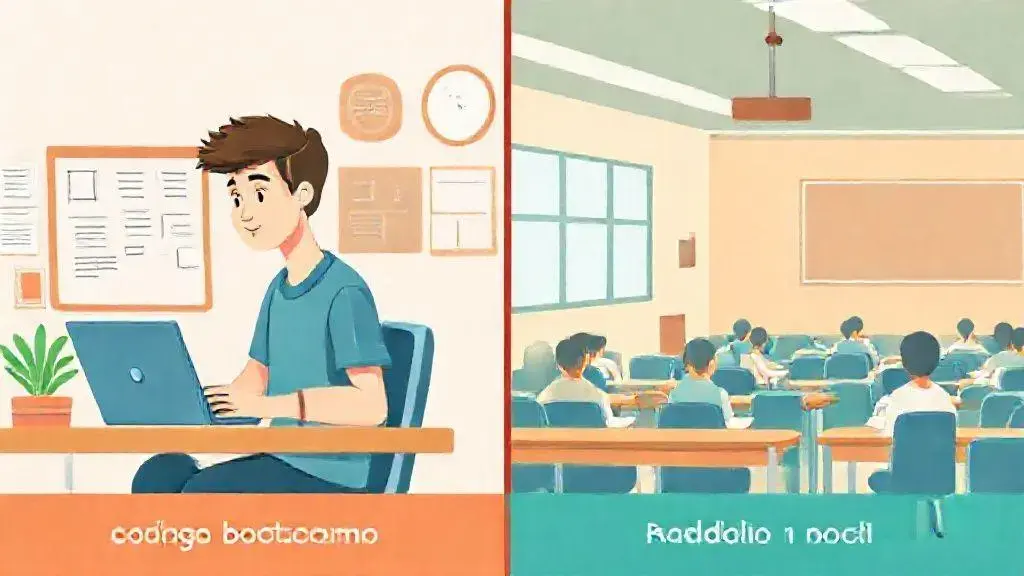Coding bootcamp popularity: why everyone is joining now

Coding bootcamp popularity is rising due to their quick, hands-on training that enables individuals from varied backgrounds to acquire in-demand tech skills and secure employment efficiently.
Coding bootcamp popularity is at an all-time high. Have you noticed how many people are diving into these programs? They’re reshaping careers and opening doors in the tech industry.
What are coding bootcamps?
Coding bootcamps are short-term, intensive training programs designed to teach individuals the skills needed for a career in technology. They typically focus on practical, hands-on learning, emphasizing coding languages and frameworks that are in high demand.
As technology evolves, the need for skilled programmers grows. This is where bootcamps shine, offering accelerated paths into the tech world. Many participants are seeking new careers or trying to enhance their existing skills.
Key Features of Coding Bootcamps
Coding bootcamps have several standout features that make them appealing. Here are some of the key elements:
- Short Duration: Most bootcamps last between 8 to 24 weeks.
- Project-Based Learning: Students work on real-life projects to build portfolios.
- Mentorship: Many programs offer support from experienced instructors.
- Job Placement Assistance: Bootcamps often help students secure interviews after completion.
The atmosphere in coding bootcamps is typically collaborative, as students learn with peers and often form study groups. Unlike traditional education, they provide a flexible learning environment with part-time and full-time options. This adaptability can be crucial for individuals balancing work and education.
Moreover, coding bootcamps often teach the most relevant technologies needed in the job market today. For instance, students may learn languages such as Python, JavaScript, or HTML/CSS. This focus ensures that upon graduation, participants have the skills to start working immediately.
In summary, coding bootcamps serve as a bridge for many aspiring tech professionals. With their practical approach and supportive learning environment, they have become a popular choice for those looking to enter the tech industry.
The rise in demand for tech skills
The demand for tech skills has surged recently, driven by the rapid evolution of technology. Companies are seeking individuals with programming and technical expertise more than ever before.
This trend is evident across various industries, from healthcare to finance. Businesses recognize that having solid tech skills is essential for staying competitive. As a result, many people are turning to coding bootcamps to acquire these skills quickly.
Factors Contributing to Increased Demand
Several factors contribute to the growing need for tech skills:
- Digital Transformation: Organizations are embracing digital technologies, leading to new job roles.
- Remote Work: The shift to remote work has increased the need for tech-savvy employees who can navigate digital tools.
- Technological Advancements: Emerging technologies like AI and blockchain are creating new skill requirements.
- Globalization: Companies compete globally, necessitating a workforce proficient in modern tech skills.
As businesses continue to prioritize technology, the types of available roles are also changing. Jobs now require a combination of technical know-how and soft skills, such as communication and problem-solving. Coding bootcamps are positioned perfectly to equip individuals with these combined skill sets.
Additionally, many industries are investing heavily in tech training. They understand that having a workforce skilled in technology dramatically boosts productivity and innovation. This broader recognition has transformed tech positions into sought-after roles across the job market.
Consequently, individuals from diverse backgrounds are finding opportunities in tech. Bootcamps are not just for recent graduates; they cater to career changers, those seeking upskilling, and even seasoned professionals looking to adapt to new technologies.
How bootcamps compare to traditional education

Coding bootcamps offer a distinct approach to learning compared to traditional education. These programs focus on practical, hands-on training that equips students with essential skills in a shorter time frame.
Many individuals prefer bootcamps because of their intensive structure. Traditional education often spans years, while bootcamps can take only a few months. This accelerated timeline is appealing to those eager to transition into tech careers quickly.
Key Differences Between Bootcamps and Traditional Education
Several factors set bootcamps apart from traditional educational paths:
- Learning Style: Bootcamps emphasize experiential learning and real-world projects.
- Curriculum Focus: The curriculum is often tailored to current industry needs, whereas traditional courses might be more theoretical.
- Flexibility: Many bootcamps offer part-time and online options, accommodating different schedules.
- Cost: Bootcamps are generally less expensive than a four-year degree, making them accessible.
In traditional education, the emphasis is often on a broad range of subjects. Students may take general education courses alongside their major requirements. This can lengthen the time it takes to graduate. In contrast, bootcamps provide targeted training focused solely on the necessary skills for technical jobs.
Furthermore, bootcamps typically have strong connections with industry leaders. They often collaborate with employers to ensure that the skills taught align with market demands. This can lead to enhanced job placement rates for graduates, as employers seek candidates with relevant and up-to-date training.
Another advantage of bootcamps is the community aspect. Students frequently collaborate and learn from each other, sharing insights and resources, which fosters a supportive environment. This contrast with traditional classrooms—where competitive atmospheres might prevail—can benefit learners and enhance their growth.
Success stories from coding bootcamp graduates
Coding bootcamp graduates often have inspiring stories that highlight the transformative impact of these programs. Many individuals enter bootcamps with little to no experience in tech, and they emerge as skilled professionals ready to enter the workforce.
Success stories frequently showcase a diverse range of backgrounds. For instance, some students were teachers or healthcare workers before discovering their passion for technology. This shift to coding has enabled them to find fulfilling careers in a fast-growing industry.
Transformative Experiences
Many bootcamp graduates report significant improvements in their lives. Here are some common themes in these success stories:
- Career Changes: Many graduates transitioned from unrelated fields to tech roles within months.
- Increased Earnings: Graduates often see a substantial increase in their salaries compared to their previous jobs.
- Fulfillment: Graduates express excitement about working on projects that impact real-world problems.
- Networking Opportunities: Bootcamps frequently help students connect with industry professionals, leading to job placements.
Another notable aspect of these stories is the supportive community developed during bootcamp. Many graduates form lasting friendships and professional connections with their peers, which can be invaluable in their career journeys. This community fosters collaboration and support, helping individuals navigate challenges in learning and job searching.
The success of bootcamp graduates is reflected in their employment outcomes as well. Numerous bootcamps report high job placement rates shortly after graduation. Companies often seek out graduates due to their hands-on experience and relevant skills, making them attractive candidates.
Personal growth is also a critical component of these success stories. Graduates often highlight how bootcamps challenged them to step out of their comfort zones, develop new skills, and build confidence in their abilities. Many have gone on to pursue further education in tech or start their tech ventures.
Future trends in coding bootcamps
The future of coding bootcamps looks bright as they adapt to the changing landscape of technology and education. These programs are evolving to meet the demands of both students and employers.
One significant trend is the integration of emerging technologies into the curriculum. Bootcamps are increasingly incorporating topics such as artificial intelligence (AI), machine learning, and data science. This prepares students for roles in fast-growing fields that require advanced skill sets.
Flexible Learning Formats
Another trend is the rise of hybrid learning models. Many bootcamps are offering a mix of online and in-person classes. This flexibility allows students to choose the learning style that best suits their needs.
- Asynchronous Learning: Students can access materials and lessons on their own schedules.
- Live Sessions: Interactive classes through video conferencing foster real-time engagement.
- Local Meetups: Some bootcamps encourage local gatherings for networking and collaboration.
- Project Showcases: Students can demonstrate their projects to potential employers in a collaborative environment.
Furthermore, bootcamps are increasingly partnering with companies to create curriculum based on real industry needs. This ensures that students learn relevant skills and tools that are in demand. Companies often participate in the hiring process, providing a direct path to employment for graduates.
Bootcamps are also recognizing the importance of diversity and inclusion in tech. Many programs are building initiatives aimed at supporting underrepresented groups in the tech industry. These initiatives help to create a broader talent pool and promote innovation.
Finally, the data-driven approach is becoming more prevalent. Bootcamps are collecting data on student performance and outcomes. This information helps them refine their programs and better support student success.
FAQ – Frequently Asked Questions about Coding Bootcamps
What are coding bootcamps?
Coding bootcamps are short-term training programs that teach programming and tech skills quickly, focusing on hands-on learning.
How long do coding bootcamps typically last?
Most coding bootcamps last between 8 to 24 weeks, offering an accelerated path into tech careers.
Are coding bootcamps expensive?
Coding bootcamps are generally more affordable than traditional college degrees, making them accessible to many individuals.
Can I find a job after completing a bootcamp?
Yes, many bootcamps have strong job placement rates, helping graduates connect with employers in the tech industry.





